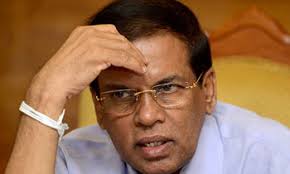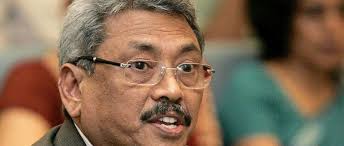It has to be a curse on the nation itself that bribery and corruption has reached the apex at present. The venality, exposed by some of the Sri Lankan Parliamentarians, Ministers, Provincial Councillors, Town Councillors, and even among the Administrators, has become disreputable and is spreading like a contagious disease, akin to a common nose cold.
The people in this land are getting sickened and repulsed on a daily basis when they become inundated with some form of hanky- panky related to corruption, either by the previous regime or the present governors, who have come to power wearing saintly masks with solemn promises to eradicate sleaze and exploitation.
Every day, it has been a case of Media having to expose some kind of jiggery-pokery involving corruption in our social system for which, the Yahapalanaya takes full credit for liberalising Freedom of Speech. Only a few days ago, skeletons in the closet of a senior Minister and State Minister were pulled out by investigative journalists in the form of a scoop, alleging the Government officials of an act of dishonesty surrounding the proposed electric train network involving staggering commissions that made the foreign investor to withdraw from the project. This, in fact, has affected the progress of the country’s railway network, as much as denying the comfort of travel to thousands of train commuters; and equally losing many employment opportunities.
Such hideous actions not only appear as a gross humiliation to the country, but act as an adversity for the Ceylon Government Railway’s expectation to move with the times. On the other hand, it will reflect as a warning for any prospective foreign investor(s) to even consider Sri Lanka as a future investment base.
The people in this land are quite accustomed to hearing about astronomical percentages as commissions demanded by various Ministers in the previous Government. The irony is that the latest infringement has taken place under the very nose of President Maithripala Sirisena who, only a few weeks ago, categorically issued a statement to all Ministers ‘not get involved in deals’ when it comes to development programmes in the country. By the same token, it is extremely strange how various delinquencies amounting to millions and billions of rupees get concealed, following Media exposures, and in return, the very Media getting blustered for such revelations! In such a backdrop, how will the country progress?
Sri Lanka parliament in session

History
History reveals how the British planters and entrepreneurs coached ‘Ceylonese’ to become masters of their own, in both legislative and executive functions, prior to achieving independence. British were mindful of the fact that ‘Ceylonese’were not ready during that era to govern the country, which has clearly indicated this fact over the past 70 years where the island nation has got left behind, while other South Asian countries have managed to progress and overtake Sri Lanka (Ceylon), which is today buried with an unprecedented debt element, and the citizenry is squeezed to the hilt with unbearable cost of living with various kinds of taxes, thus leaving the whole economy in doldrums.
Dilly-dally
Despite election promises to expose the charlatans and swindlers of the past, the new rulers who promised, prior to the election, four years ago, have not brought a single politician to book in a manner they assured, rather, procrastination has become the order of the day with intermittent court hearings, sentencing the odd politician to jail, and bailing them out etc. This kind of television drama has only made the people immune to such activities, which is seen as the Government ‘playing for the gallery’.
However, during the ‘Yahapalanaya administration’, Sri Lanka has never seen such democracy and court freedom to maintain law and order, and allowed Media freedom. Yet, at times, the Media is accused of some of the government hierachy, for exposing errant government members. The general consensus of the public, in such a dilemma, is for the Government to come clean in all its dealings as, obviously, there is no smoke without fire.
Assassination plot
The latest political drama that has come to the fore is about a plot uncovered to assassinate the country’s President and the former Secretary of Defence by a senior Police official. Finally, after significant public protests, the alleged D.I.G has been interdicted.


What is the function of a Police force in a country? It is deployed to maintain law and order. However, when a D.I.G gets allegedly accused of a murder attempt, the entire scenario becomes not only serious, but more than a buffoonery. People have begun to question, after such revelations, as to why this alleged D.I.G was initially transferred to a different (IT) department, and the interdiction order came to play only after pressure was exerted from all sides. The incident turned vinegary when the Opposition came out with the allegation that this particular D.I.G was spotted in the Kelaniya Temple performing a ‘Bodhi Pooja’, with the Inspector General of Police, which of course takes the cake. How can a country run in this manner?
IGP Trapped inside an alleged plot!

Deterioration from all sides
Generally speaking, the progress of a nation cannot be identified only by changing the skyline, with umpteen number of skyscrapers and/or building expressways on borrowed money from international monetary institutions, but it is the responsibility of rulers to think about the quality of living of citizens and education of children that have deteriorated over the years. Some years ago, the ‘history’ subject was removed from the school syllabus by a former Minister of Education. Likewise, the health sector has worsened despite some of the prices of costly drugs been reduced by the current Minister of Health. Hospitals throughout the country have reached a critical state where hospital pharmacies have dried up of drugs and the patients have to buy medicine from private pharmacies, which have sprung up like mushrooms, particularly around hospitals. The latest news revealed number of patients have gone blind after using a particular eye drop, which is followed by a commission of enquiry. Do we have to wait until disasters happen to act, which seems to be the Sri Lankan style? This is the greatest folly or weakness amongst Sri Lankan rulers, politicians as well as administrative staff – the lack of common-sense or the lack of presence of mind.
Pharmacies
Sri Lanka Medical Ordinance No. 26 of 1927 makes provision for registration of the pharmacists’ community, governed by the Sri Lanka Medical Council, to dispense drugs and poisons only to registered pharmacists and pharmaceutical chemists. A special provision in the Medical Ordinance exists to register Apothecaries (or Assistant Medical Practitioners) and Estate Apothecaries as pharmacists.
An alarming state of affairs, that is common countrywide, is where qualified and registered pharmacists becoming entrepreneurs by sub-letting their pharmacies (blatantly using their registration certificate) to agents who are not qualified pharmacists. Agents, in turn, employ cashiers without any knowledge about the drugs they dispense to the public, except their basic knowledge on brand names.
When inspectors from the Ministry of Health raid pharmacies on ‘flying visits’and find the licence holder not present inside the premises, the cashier reportedly seems to come out with the excuse that “the boss just went out”! By law, the licence holder of a pharmacy should be present on site always when dispensing drugs to the public, and in case of his absence, the law dictates to shut the pharmacy for the public. It is also alleged that some of the corrupt Health Ministry inspectors turn a blind eye to the situation for a monthly cash reward of Rs. 15,000.
A qualified pharmacist’s duty should be to label the drugs with its name, strength, and dosage, rather than placing assorted tablets into small envelopes and marking only as TDS, BD, and Nocte respectively.
In developed countries, pharmacists make it a point to advise patients on the dosage, interactions, and side effects of drugs they dispense to the public, contrary to dumping a few tablets into a small unmarked envelopes, where even the patient does not know what he/she is consuming and for what! This practice is only common to Sri Lanka.
pic credit: Google photos





